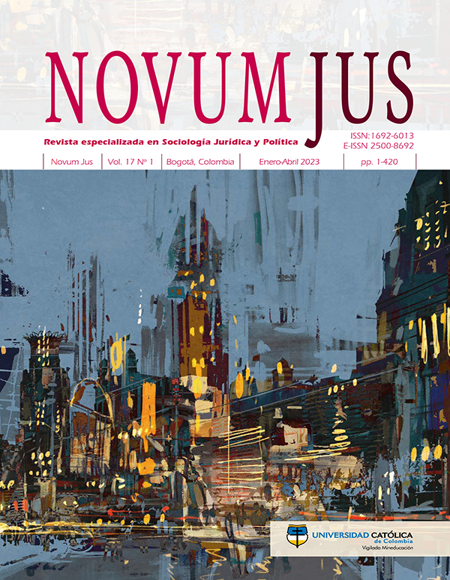
This work is licensed under a Creative Commons Attribution-NonCommercial 4.0 International License.
Authors who publish with this journal agree to the following terms:
- Authors retain copyright and grant the journal right of first publication with the work simultaneously licensed under a Creative Commons Attribution Non-Commercial License that allows others to share the work with an acknowledgement of the work's authorship and initial publication in this journal.
- Authors are able to enter into separate, additional contractual arrangements for the non-exclusive distribution of the journal's published version of the work (e.g., post it to an institutional repository or publish it in a book), with an acknowledgement of its initial publication in this journal.
- Authors are permitted and encouraged to post their work online (e.g., in institutional repositories or on their website) prior to and during the submission process, as it can lead to productive exchanges, as well as earlier and greater citation of published work (See The Effect of Open Access).
Abstract
This paper analyzes, on the one hand, elements of moral philosophy that provide background to understand the causes of war and its relationship with the exercise of power. On the other hand, it provides an overview of the current international legal system, suggesting the need to reformulate the institutional system to ensure the principle of non-use of war. Both philosophical and legal elements show that the phenomenon of war cannot be eradicated. And there is also a need to rethink the rules that organize international power around the monopoly of institutional force.

References
Badiou, Alain. Circunstancias. Buenos Aires: Libros del Zorzal, 2004.
Bleckmann, Albert. “Das Souveranitätsprinzip im Völkerrecht”. Archiv des Völkerrechts 23 (1985): 9-11.
Bobbio, Norberto. El problema de la guerra y de las vías de la paz. Barcelona: Altaya,1998.
Bothe, Michael. “Achter Abschnitt. Friedenssicherung und Kriegsrecht” en Völkerrecht, editado por Wolfgang Vitzthum y Alexander Proelß, 755-874. Berlín: De Gruyter, 2020.
Chomsky, Noam. Estados canallas: el imperio de la fuerza en los asuntos mundiales. Buenos Aires: Paidós, 2002.
Chomsky, Noam. La quinta libertad: la intervención de los Estados Unidos en América Central y la lucha por la paz. Barcelona: Crítica, 2004.
Christopher, Paul. “Just War Theory”. Tesis doctoral, Universidad de Massachusetts, 1990.
Cot, Jean Paul y Alain Pellet. La Charte de Nations Unies. París: Económica, 1991.
Fassbender, Bardo. “Die Gegenwartskrise des völkerrechtlichen Gewaltverbotes vor dem Hintergrund der geschichtlichen Entwicklung”. Europäische Grundrechte-Zeitschrift (EuGRZ) 31 (2004): 241-256.
Ferrari Puerta, Alberto. “El concepto de guerra justa a través de los tiempos”. Novum Jus 15, núm. 1 (2021): 91-115. https://doi.org/10.14718/NovumJus.2021.15.1.5 (acceso junio 26, 2022).
Fuentes Torrijo, Ximena. “La prohibición de la amenaza y del uso de la fuerza por el derecho internacional”. Araucaria: Revista Iberoamericana de Filosofía, Política, Humanidades y Relaciones Internacionales 16, núm. 32 (2014): 255-267.
Grossman, Vasili. Vida y destino. Barcelona: Galaxia Gutenberg, 2016.
Grossman, Vasily. Vida y destino. 5ª ed. Barcelona: Galaxia Gutenberg, 2020.
Hegel, G. W. Friedrich. Principios de la filosofía del derecho. Barcelona: Edhasa, 1998.
Higgins, Rosalyn. “The Place on International Law in the Settlement of Disputes by the Security Council”. American Journal of International Law 64, núm. 1 (1970): 1-18.
Hobbes, Thomas. Leviatán. Barcelona: Altaya 1997.
Jaeger, Werner. “Culminación y crisis del espíritu ático”, serie Paideia: Los ideales de la cultura griega núm. 2, traducido por Joaquín Xiral. Ciudad de México: Fondo de Cultura Económica, 2001.
Kant, Immanuel. La paz perpetua. Buenos Aires: Longseller, 2001.
Kelsen, Hans. The Law of United Nations. Londres: Stevens, 1950.
Klenner, Arturo. “En torno a la filosofía del derecho de Hegel: cuestiones y objeciones”. Polis 3 (2002): 1-15. http://journals.openedition.org/polis/7735 (acceso junio 28, 2022).
Knut, Ipsen. Völkerrecht. Múnich: Becke, 2004.
Lévinas, Emmanuel. Totalidad e infinito. Salamanca: Sígueme, 1999.
Mizrahi, Esteban. “Soberanía y guerra en la filosofía del derecho de Hegel”. Revista de Humanidades de Valparaíso núm. 18 (2021): 79-99. http://dx.doi.org/10.22370/rhv2021iss18pp79-99 (acceso julio 3, 2022).
Molina Santa María, Ximena y Tania Paola Bautista Safar. “Del choque de civilizaciones al choque con la realidad: Samuel Huntington 20 años después”. El Ágora USB 19, núm. 1 (2019): 220-230. https://doi.org/10.21500/16578031.3392 (acceso junio 28, 2022).
Naciones Unidas. Carta de las Naciones Unidas. San Francisco, 26 de junio de 1945.
Organización de Estados Americanos [OEA]. Carta Democrática Interamericana. Lima, 11 de septiembre de 2001.
Organización de las Naciones Unidas [ONU]. Pacto Internacional de Derechos Económicos, Sociales y Culturales. Nueva York, 16 de diciembre de 1966.
Perazzo, Silvia Alejandra. “Reforma de Naciones Unidas: redimensionar el sistema de seguridad colectivo”. Política y Estrategia núm. 107 (2007): 11-25.
Plauto. Asinaria. Ciudad de México: Gredos, 2016.
Pufendorf, Samuel. De los deberes del hombre y del ciudadano según la ley natural, en dos libros. Madrid: Centro de Estudios Políticos y Constitucionales, 2002.
Reisman, W. Michael. “Coercion and Self-Determination: Construing Charter Article 2(4)”. The American Journal of International Law 78, núm. 3 (1984): 642-645.
Ruiz Miguel, Alfonso. “Paz y guerra” en Filosofía política II: Teoría del Estado, editado por Elías Díaz y Alfonso Ruiz Miguel, 245-263. Madrid: Trotta, 1996.
Saada, Julie. “El lobo, el monstruo y el burgués”. Deus mortalis 1, núm. 7 (2008): 105-122.
Santiago Oropeza, Teresa. “Kant la guerra y el progreso moral”. Revista de filosofía open insight 7 núm. 11 (2016): 11-33. http://openinsight.com.mx/index.php/open/article/view/166/155 (acceso noviembre 12, 2022).
Seidl-Hohenveldern, Ignaz y Torsten Stein. Völkerrecht. Berlín: Carl Heymanns Verlag, 2000.
Silva González, Jorge Luis y Orelvis Gener Crespo. “El Consejo de Seguridad de las Naciones Unidas: ¿un órgano democrático?”. Universidad y Sociedad 12, núm. 2 (2020): 241-250.
Walzer, Michael. Guerra, política y moral. Barcelona: Paidós, 2001.
Walzer, Michael. Guerras justas e injustas. Barcelona: Paidós, 2001.





















